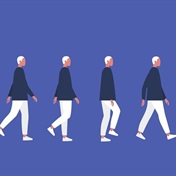The number of people with dementia is expected to almost double to 65.7 million by 2030 as the world population ages, according to a World Health Organisation report.
And by 2050 the number of sufferers could be more than three times the current figure of 35.6 million, the UN body said.
The report released by WHO and Alzheimer's disease International estimates the current cost of treating and caring for those with the condition at $604 billion a year.
Dementia is caused by a variety of brain illnesses that affect memory, thinking, behaviour and the ability to perform everyday activities. Alzheimer's disease is the most common cause of dementia and makes up about 70% of cases.
Healthcare workers inadequately trained
The report said far more effective diagnosis was needed, as even in high income countries only 20 to 50% of dementia cases are routinely recognised.
"Since we know the prevalence of the disease will explode in this century as we all live longer – the risk of dementia is 1 in 8 for those over 65 and a shocking 1 in 2.5 for those over 85 – its impact will become greater as the decades go by," according to Shekhar Saxena, head of the mental health department at WHO.
"We need to increase our capacity to detect dementia early and to provide the necessary health and social care," said Oleg Chestnov, assistant director general of Non-communicable Diseases and Mental Health at WHO.
"Much can be done to decrease the burden of dementia. Health-care workers are often not adequately trained to recognise dementia."
Lack of info about the disease
Only eight countries worldwide – Australia, Britain, Denmark, France, Japan, South Korea, the Netherlands and Norway – currently have national programmes in place to address dementia, according to the report "Dementia: a public health priority".
Germany and Sweden have set out lists of recommendations.
The study also highlights a general lack of information and understanding about the disease, fuelling stigma with the result that people sometimes delay seeking support.
"It is now vital to tackle the poor levels of public awareness and understanding, and to drastically reduce the stigma associated with dementia," said Marc Wortmann, executive director of Alzheimer's disease International.
In its report, WHO recommends that authorities seek to reduce the stigma that has long been associated with dementia, and improve general care for victims, along with support for caregivers.
It is currently not possible to treat dementia, but progress of the disease can in some cases be slowed down.
(Sapa, April 2012)
Read more:




 Publications
Publications
 Partners
Partners














